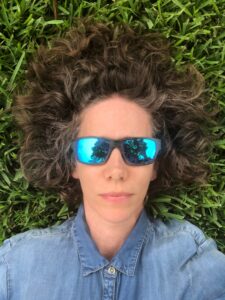By Dawn Davies
It was winter up North. I was four, riding shotgun with my dad in a car on the highway. The naked trees scarred the grey sky, and now and again, birds flocked and dipped in the wind like shards of glass slicing the clouds. My cheeks burned hot. My dad had rolled the driver’s side window down an inch and the whistle of the cold wind sucked his cigarette smoke out the crack. Every time he took a drag, the tip of his cigarette glowed orange underneath the grey of the ash. When it got low, he lit a fresh one from it, then tossed the butt out the window. The inside of the car smelled like Kool menthols, sedan vinyl, and drugstore aftershave.
I was unbuckled because we all were back then, and I fidgeted in my seat, uncomfortably eager to reach a bridge I would be able to see from the driver’s side window. I didn’t know why I felt nervous, only that I had a knot in my stomach that periodically lurched into my throat.
When we got close to the bridge, I slid across the bench seat, grab my dad’s arm, and peered down the divide between the two sides of the highway into a gully that led to a tunnel, where I got a quick glimpse of a black hole framed by the arch of the bridge. I could never quite see what was inside that little hole, but I kept trying. I needed to see it, but I didn’t know why.
I suppressed a thrill of fear whenever I saw it. Mostly I feared missing the opportunity to look inside the hole, because I believed I must look inside it, or else the day would go wrong. The hole bothered me then, and the memory of it bothering me has bothered me for most of my life, with the kind of prodding nag you feel when you are on a 46-year hike and there is a pebble in your shoe. You can ignore it for a while, but eventually it rubs, then blisters, then becomes infected. Then it festers and begins to rot, and you worry about it possibly killing you.
For years I didn’t remember where we went on those rides, so I didn’t know what to make of the memories, or of my fear of seeing that bridge, so I banked them alongside other memories that made no sense, like the time I was awakened from sleep by yelling and the shattering of the storm door glass, and the next day, after the doctor had stitched up my mother’s hand, I broke the household silence by asking what had happened and my parents said, “Nothing.” Or when I once got up the courage to ask my dad why he was always so mad at me, he told me to ask my mother, and the bitter way he said it made me afraid of the truth. Or that time when, after several years of chasing his love and not catching it, I asked my mother if he was my real father and she said, “Shame on you.”
Years later, while visiting my dad, I brought up that morning drive and the bridge and he said, “That was when I used to take you to daycare.”
“I went to daycare?”
“You don’t remember? It was a home daycare. Run by a guy. You cried every time we pulled up there. Every day for a year you cried, and I never knew why.”
“And you kept dropping me off there? To a home daycare center run by a guy? To a place that made me cry every day?”
He shrugged.
“Lots of things made you cry.” He shrugged again. He was dying from cancer at the time, so I didn’t push, but a bolt of electricity shot through me. My husband, who was with us, raised his eyebrows and gave me a look of alarm, while my soul cracked and shards of it flew off like birds in a long-ago winter sky. My cheeks burned hot and I felt jitters akin to those I had felt when I looked for that hole under the arch of the bridge so many years before. My body puffed up like a balloon, rose to the ceiling, and tried to find a way out of the room. I needed to get home. Later that night, I couldn’t sleep.
I know most recollection involves reconstruction, and most reconstruction involves some sort of distortion of exactitude, especially early memories, so we are right to question ourselves. As a memoirist, I do this often. I even question my subjective truth and sometimes feel guilt when I have a memory I think someone else won’t like. This could relate to how my family viewed truth. Even into adulthood I was told by my parents that what I experienced—or what I believed or what I witnessed—either was not true or was not worth paying attention to, which may be why my dad could repeatedly leave me at a place that made me cry every time we pulled up to it. Or why, when after the 23andMe results came back showing that he and I were unrelated, my mother told me it was a mistake and the DNA test must be wrong.
I can’t know for certain, but I suspect this emotional trickery has affected my short-term memory even now, since I often struggle to precisely remember things that have recently happened, specifically things people say in heated conversation, especially when I am upset. And during conflict, even though I have no interest in it doing so, my body tries to puff up like a balloon and find a way out of the room.
After my dad died, the fragments of this part of my childhood came out of my mind like shards working their way out of my skin. They found each other and glided in place in a tectonic way, fusing into a coherence I hadn’t possessed at age four or seven or ten because I’d had no context.
Enlightenment is often delivered by the plunging of a two-edged sword. You get the truth, but then you must live with it. I think I understand why my dad was so cavalier about what happened to me, then, and throughout the rest of my life—I wasn’t his child and he knew it, and what’s worse, he’d been tricked into thinking I was. I also understand why I cried every time we pulled up to the daycare, thought I don’t remember much more than what I’m about to say and I’ve no interest in trying. This will be the last I speak of it:
It was winter up North and I was four. My dad drove me to daycare in a smoke-filled car. It was part of our morning routine. Each day we passed a bridge with an arch, and inside that arch was a little hole that terrified me every time we saw it. When we pulled up to the plain house off the highway, I cried, then my dad peeled me off his legs and led me up the front steps to the house, where I went inside and watched from the window of a weatherized front room while he drove away. There were paper cups with juice and plastic bowls of graham crackers. There were other kids who were, like me, too young to go to school. There was a medium-sized man with a beard who wore his camera like a necklace. He held my hand as we walked down the cellar steps for our special time together.
“Isn’t this fun,” he’d say. “We’re going to play a game. Let’s take off your shirt and you can show me your belly. Now your panties. Good girl. Lie back on the beanbag. Smile. Bend your legs like a frog. Show me where you go pee. Let me see that little hole.”
Dawn Davies is the author of Mothers of Sparta: A Memoir in Pieces (Flatiron Books, 2018), which won the Florida Book Award Gold Medal for General Nonfiction and the GLCA New Writers Award for Creative Nonfiction. Her essays and stories have been Pushcart Special Mentions and Best American notables. Her work can be found in McSweeney’s Quarterly Concern, The Missouri Review, Poetry Northwest, The Alaska Review, Narrative, Fourth Genre, and elsewhere. She lives in Florida. Visit her website and find her on Instagram @dawnlandia.





